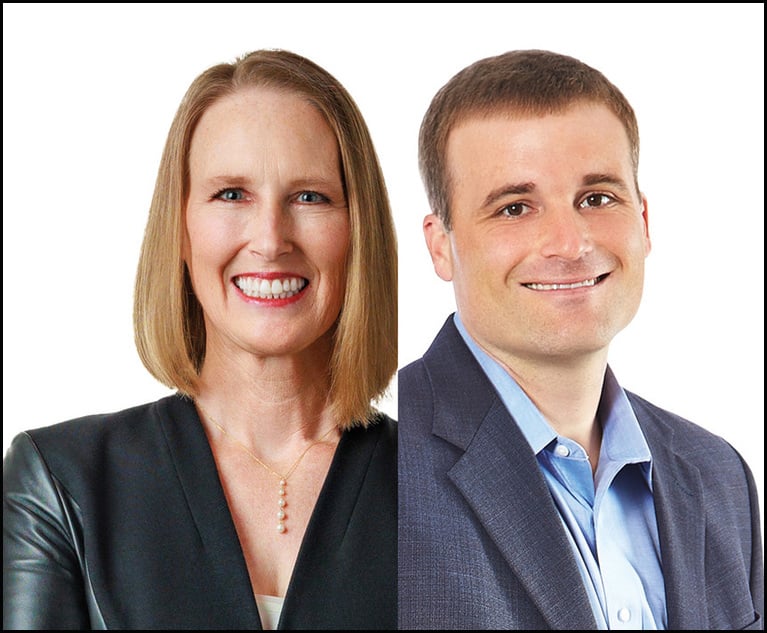Firms Keep California Dreamin' Even as Pandemic Rages
All of this interest, among firms of different shapes and sizes, indicates the competitiveness of the California legal marketplace and the exceptional vitality of the state's economy even in the midst of a pandemic, particularly in the Bay Area.
July 21, 2020 at 05:30 AM
8 minute read
![]()
The ongoing COVID-19 pandemic hasn't stopped several elite global firms from acting on long-held plans to move into Northern California, while other firms are taking advantage of the upheaval in the marketplace to boost their own presence in the world's fifth-largest economy.
Since the start of June, Paul, Weiss, Rifkind, Wharton & Garrison revealed its intention to open a San Francisco office and Freshfields announced its arrival in Silicon Valley with five partners recruited from highly regarded players. The last several months have also seen Haynes and Boone, U.K.-based insurance specialists Kennedys, and financial services boutique Murphy & McGonigle open up doors in San Francisco for the first time.
"A lot of this has been strategically in play well before COVID-19, but with COVID, a lot of opportunities are coming out in the marketplace," said Larry Watanabe of Watanabe Schwartz.
The San Diego-based recruiter drew a distinction between the duo of Paul Weiss and Freshfields and the rest of the market, adding that he'd been in discussion with the former firm for several years about its potential entry into San Francisco.
Paul Weiss publicized its intention to open in San Francisco in early June when it poached Boies Schiller Flexner partners Bill Isaacson and Karen Dunn. While both are based in Washington, Dunn represents a number of tech clients, including Oracle, Apple and Uber. The firm has yet to announce the hire of any California-based partners, but an announcement is only a matter of time.
"It's something that they've thought about very carefully for a long time," Watanabe said of Paul Weiss. "It's not just that an opportunity presented itself and they decided to act on it."
Paul Weiss chairman Brad Karp confirmed that the firm had expected at the start of 2020 that this would be the year it moved into San Francisco, adding that the coronavirus pandemic has neither slowed nor accelerated its plans.
"There are a number of extraordinarily important and sophisticated technology companies in Northern California, which are grappling with significant legal, regulatory and political challenges and exposures, and whose influence continues to grow," he said. "Because our goal is to represent the most important companies in the world in their most significant matters, opening an office in Northern California is a natural strategic move for us."
The calculation for Freshfields, which has been acting on its heightened ambitions for the U.S. since the fall, is similar. The firm already has a client base in Silicon Valley, thanks to its work representing European clients on antitrust and international M&A matters. The addition of lawyers from Davis Polk & Wardwell, Latham & Watkins, Sidley Austin and Wilson Sonsini Goodrich & Rosati is intended to broaden its opportunities in the market, particularly by giving clients access to a worldwide team of dealmakers.
"Here, clients are global from day one," said Silicon Valley managing partner Sarah Solum, who joined the firm from Davis Polk. "We can be jurisdiction agnostic when we're in a firm like Freshfields. We've got the people who can do these deals anywhere in the world."
Even if planned, the timing of the two firms' entries comes at a fortuitous moment for adding new talent, according to Watanabe. Lawyers are particularly attuned to the financial stability of their current homes, and a 30 minutes of their time for a Zoom call is not a significant ask.
"At the highest levels, at this juncture, the vast majority of partners, while they may not be engaged in an active search to leave their firm, are at least wiling to sit down to consider and talk about what's going on in the marketplace," he said.
For other firms that don't have the same level of prestige (or profits per equity partner) as Freshfields and Paul Weiss, the move to expand in California is not divorced from broader strategic considerations. But the pandemic affords an opportunity to pick up talent that might not have been available under ordinary circumstances.
Before 2020, Haynes and Boone, for example, had flagged California for its 2025 strategic plan, while Murphy & McGonigle had grown to recognize that cryptocurrency exchanges and other fintech companies were becoming a larger share of its client mix.
"They all want to grow. You could say that Paul Weiss and Freshfields have a more precise plan on how they want to go about doing that, and yet the overall goal is similar," said San Francisco-based recruiter Avis Caravello. "None of them are being deterred by the present economic situation and the uncertainty going forward for the next couple of years."
Haynes and Boone opened in Silicon Valley in 2009, and in May announced an expansion into San Francisco with two life science attorneys from McDermott Will & Emery.
"We looked at the overall size of the legal market, and where we thought innovation in the wider market was going to occur, and—in a war for talent—where the talent would be," said managing partner Tim Powers.
He emphasized that the move fits with a long-term strategy of growing on both coasts to become a truly national firm. Connected to that, the firm has interest in adding a Los Angeles office with a more full-service focus than its existing real estate and corporate-heavy Orange County office.
Powers acknowledged that the pandemic and associated recession has provided opportunities to pick up talent, adding that the firm still needs to be judicious in ensuring laterals are joining for the right reasons.
"A firm like ours that performs well in a down market because of our financial stability, I think that can be attractive," he said. "But they have to be attracted to the firm for what you would offer to them as a platform, both substantively and culturally."
Murphy & McGonigle, a decade-old financial-services boutique with over 50 lawyers in three East Coast offices, also anticipated a move into San Francisco. Managing partner James Murphy found himself traveling frequently to Silicon Valley to give speeches on the evolving regulatory environment for cryptocurrency, and a recent review of the firm's client-base revealed that 25% of revenue was coming from California clients.
"It felt like 2020 was the year that things were going to come together for us," Murphy said.
The firm announced its arrival in San Francisco last week with the hire of former Schiff Hardin partner Mauricio S. Beugelmans.
But the pandemic has altered the firm's calculations. While Murphy said that he thought the firm's embrace of technology and lean structure would be appealing to laterals under ordinary circumstances, he's finding that the partners he's been talking to for the last year are looking closely at their existing firms' adjustments to the pandemic and are enticed by his firm's stability.
"We have been fortunate that we haven't had to cut anyone or anyone's pay," he said. "That makes us a little bit of an exception in the market."
Also joining the mix is Kennedys, which launched in San Francisco with four maritime lawyers from Hinshaw & Culbertson in June.
All of this interest, among firms of different shapes and sizes, indicates the competitiveness of the California legal marketplace and the exceptional vitality of the state's economy, particularly in the Bay Area.
"At the very beginning of COVID-19, I thought this would be very different from anything I've seen in 30 years. I thought the brakes would be put on everything, but its been the opposite," Caravello said. "The activity now has been more robust than during the dotcom downturn, and the 2008 crash. Some firms have retreated, but the firms that are healthy enough and see beyond the horizon of the next two years know this is an optimal time to grow in a market where it's very difficult to capture top talent."
Read More
Freshfields Is Gaining Traction in the US. Is This Time Different?
This content has been archived. It is available through our partners, LexisNexis® and Bloomberg Law.
To view this content, please continue to their sites.
Not a Lexis Subscriber?
Subscribe Now
Not a Bloomberg Law Subscriber?
Subscribe Now
NOT FOR REPRINT
© 2025 ALM Global, LLC, All Rights Reserved. Request academic re-use from www.copyright.com. All other uses, submit a request to [email protected]. For more information visit Asset & Logo Licensing.
You Might Like
View All

Many LA County Law Firms Remain Open, Mobilize to Support Affected Employees Amid Historic Firestorm

Law Firms Close Southern California Offices Amid Devastating Wildfires
Law Firms Mentioned
Trending Stories
- 1'It's Not Going to Be Pretty': PayPal, Capital One Face Novel Class Actions Over 'Poaching' Commissions Owed Influencers
- 211th Circuit Rejects Trump's Emergency Request as DOJ Prepares to Release Special Counsel's Final Report
- 3Supreme Court Takes Up Challenge to ACA Task Force
- 4'Tragedy of Unspeakable Proportions:' Could Edison, DWP, Face Lawsuits Over LA Wildfires?
- 5Meta Pulls Plug on DEI Programs
Who Got The Work
Michael G. Bongiorno, Andrew Scott Dulberg and Elizabeth E. Driscoll from Wilmer Cutler Pickering Hale and Dorr have stepped in to represent Symbotic Inc., an A.I.-enabled technology platform that focuses on increasing supply chain efficiency, and other defendants in a pending shareholder derivative lawsuit. The case, filed Oct. 2 in Massachusetts District Court by the Brown Law Firm on behalf of Stephen Austen, accuses certain officers and directors of misleading investors in regard to Symbotic's potential for margin growth by failing to disclose that the company was not equipped to timely deploy its systems or manage expenses through project delays. The case, assigned to U.S. District Judge Nathaniel M. Gorton, is 1:24-cv-12522, Austen v. Cohen et al.
Who Got The Work
Edmund Polubinski and Marie Killmond of Davis Polk & Wardwell have entered appearances for data platform software development company MongoDB and other defendants in a pending shareholder derivative lawsuit. The action, filed Oct. 7 in New York Southern District Court by the Brown Law Firm, accuses the company's directors and/or officers of falsely expressing confidence in the company’s restructuring of its sales incentive plan and downplaying the severity of decreases in its upfront commitments. The case is 1:24-cv-07594, Roy v. Ittycheria et al.
Who Got The Work
Amy O. Bruchs and Kurt F. Ellison of Michael Best & Friedrich have entered appearances for Epic Systems Corp. in a pending employment discrimination lawsuit. The suit was filed Sept. 7 in Wisconsin Western District Court by Levine Eisberner LLC and Siri & Glimstad on behalf of a project manager who claims that he was wrongfully terminated after applying for a religious exemption to the defendant's COVID-19 vaccine mandate. The case, assigned to U.S. Magistrate Judge Anita Marie Boor, is 3:24-cv-00630, Secker, Nathan v. Epic Systems Corporation.
Who Got The Work
David X. Sullivan, Thomas J. Finn and Gregory A. Hall from McCarter & English have entered appearances for Sunrun Installation Services in a pending civil rights lawsuit. The complaint was filed Sept. 4 in Connecticut District Court by attorney Robert M. Berke on behalf of former employee George Edward Steins, who was arrested and charged with employing an unregistered home improvement salesperson. The complaint alleges that had Sunrun informed the Connecticut Department of Consumer Protection that the plaintiff's employment had ended in 2017 and that he no longer held Sunrun's home improvement contractor license, he would not have been hit with charges, which were dismissed in May 2024. The case, assigned to U.S. District Judge Jeffrey A. Meyer, is 3:24-cv-01423, Steins v. Sunrun, Inc. et al.
Who Got The Work
Greenberg Traurig shareholder Joshua L. Raskin has entered an appearance for boohoo.com UK Ltd. in a pending patent infringement lawsuit. The suit, filed Sept. 3 in Texas Eastern District Court by Rozier Hardt McDonough on behalf of Alto Dynamics, asserts five patents related to an online shopping platform. The case, assigned to U.S. District Judge Rodney Gilstrap, is 2:24-cv-00719, Alto Dynamics, LLC v. boohoo.com UK Limited.
Featured Firms
Law Offices of Gary Martin Hays & Associates, P.C.
(470) 294-1674
Law Offices of Mark E. Salomone
(857) 444-6468
Smith & Hassler
(713) 739-1250







